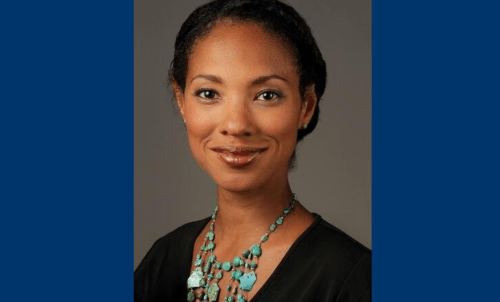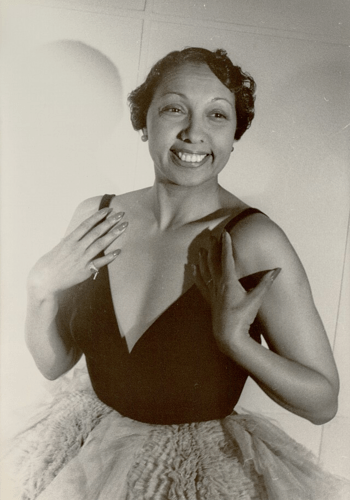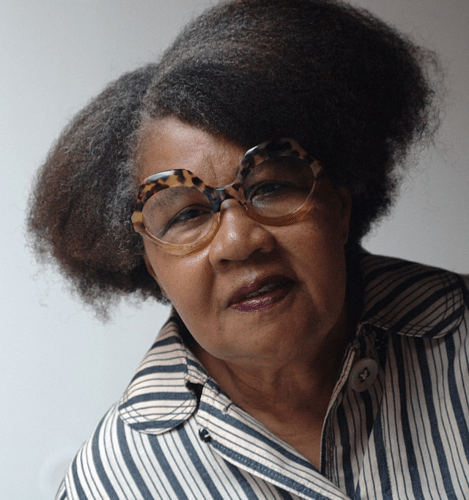Meet the FAS faculty: Kaiama L. Glover
Across the African diaspora, Black women must live up to political and social obligations and gendered expectations. But while concepts like “Black Girl Magic” and Black excellence provide empowering narratives, can they also become a source of social pressure? This is the kind of question that Kaiama L. Glover investigates through her scholarship on African diasporic literature.

To nominate an FAS faculty member to be featured in this series, please email fas.dean@yale.edu
Across the African diaspora, Black women must live up to political and social obligations and gendered expectations. But while concepts like “Black Girl Magic” and Black excellence provide empowering narratives, can they also become a source of social pressure? This is the kind of question that Kaiama L. Glover investigates through her scholarship on African diasporic literature.
Glover is Professor of African American Studies and French in the Yale Faculty of Arts and Sciences. She joined the FAS in August 2023. Prior to Yale, Glover earned her Ph.D. at Columbia University and served as Professor of French and Africana Studies at Barnard College.
Glover became interested in African American Studies during her undergraduate years at Harvard, where she was advised by celebrated theorist Henry Louis Gates, Jr., known for his landmark contributions to literary criticism, his genealogy series Finding Your Roots, and other PBS documentaries like Faces of America and African American Lives.

Portrait of French performer Josephine Baker taken on October 20, 1949 (Carl Van Vechten/Wikimedia Commons)
While Glover was choosing her undergraduate thesis topic, Gates suggested that she combine her interest in French and African American Studies, which led her to 20th-century American performer Josephine Baker. Baker began her musical career in New York City before heading to France in 1925, where she later became a spy for Deuxième Bureau, the French military intelligence agency, in World War II.
Glover traveled to Paris, France to research her thesis and returned after graduation as a Fulbright Fellow, enabling her to develop her interest in the experiences and cultural production of Black people living under and in the wake of French colonization, in contrast to the experiences of Black American expatriates in France.
“While I was there, I started thinking about how France had been this wonderful, safe haven for Black Americans at particular times in our history,” she said, “but at the same time, had engaged in the slave trade and been a colonial power that subjugated Black people from places outside of the United States.”
In addition to her scholarship in the overlapping fields of Caribbean, French postcolonial, and Haitian studies, Glover is a translator of francophone fiction and non-fiction. She focuses not just on the literal translation of words but translates feelings by finding expressions that evoke similar sentiments in English as they do in the original French and Creole.
“There are words or syntactical structures that are uniquely, idiosyncratically Haitian, and so, for example, I may leave some Creole words or phrasing intact in English to remind the reader that this is not just an English text but actually has the weight of a history that is transmitted through language,” she explained.
In addition to translating, Glover also edited several collected volumes, including for Yale French Studies, and published widely in scholarly journals and various public forums. Glover is also the author of two monographs. Her first book, Haiti Unbound: A Spiralist Challenge to the Postcolonial Canon, was published in 2011, and her second, A Regarded Self; Caribbean Womanhood and the Ethics of Disorderly Being, was published in 2021.
Inspired by her literature classes, Glover sought to delve into the fact that the women characters in the works she found most compelling were those that most troubled her students. What was it about these characters that elicited strong reactions from herself and from other readers?

Famed Caribbean-American author Jamaica Kincaid. Kincaid is one of many of the authors Glover refers to in her book.
She found that the authors of those books had created these characters as “forces of disorder” who prioritized their own desires and self-interest. Glover analyzes these rebellious female protagonists across novels written by Marie Chauvet, Maryse Condé, René Depestre, Marlon James, and Jamaica Kincaid, characters whose needs are at odds with the needs of their community.
“What happens to women who do not find their position in those communities? What happens when they say ‘no,’ or when they say, ‘I refuse to be a good friend, a good sister, a good mother?’” Glover asked. “Do we still accord them, as readers, any empathy?”
Through this book, Glover encourages readers to examine gendered societal expectations in their own lives and the harm these norms can inflict on Black women across the diaspora.
“One of the reasons that I wrote this book was to dispel some of the myths of ‘Black Girl Magic’ – or at least to say, all this magic comes at a cost. So, when talking about ‘Black girl magic’ or ‘Black joy’ or a sort of ‘infinite resilience,’ as if these things are just innate to Black people and to Black women, and that it doesn’t cost us anything, that is a myth I wanted to dispel. What, exactly, is the cost to being magical and wonderful and useful and helpful?”
While Glover is only just completing her first year at Yale, she already appreciates the scholarly approaches to the linguistic, cultural, and racial dynamics of language and literature her colleagues and students are pursuing here. Glover highlighted how Yale is approaching a more expansive view of Blackness, referencing colleagues like Marlene Daut, Professor of French and African Diaspora Studies, who also focuses on the Black Atlantic.
“When I went through the process of recruitment at Yale, it became very clear to me that, in African American studies in particular, they were actually not trying to get me to build something on my own, but they were asking me to join something that was already very much in the process of being built,” she said, “and it felt very, very encouraging that I would have a cohort and a community of like-minded colleagues who were interested in expanding the field in in different directions.”
Among those colleagues is Spanish Department faculty member Alex Gil, with whom Glover collaborates on the peer-reviewed journal archipelagos | a journal of Caribbean digital praxis, which they co-founded in 2014; the interactive mapping visualization In the Same Boats | Toward an Afro-Atlantic Intellectual Cartography; and, most recently, the $5M Mellon Foundation–funded initiative The Caribbean Digital Scholarship Collective.
Coming to Yale has also shifted her work-life balance. She has enjoyed fully immersing herself in the campus community while teaching and attending or organizing events during the two-to-three days a week she spends in New Haven, while her family remains in New York City.
“I’m generally back home in NYC on Wednesday, right around dinnertime, so [with my commute] my kids can stay in the schools that they love and the communities that they love,” she said.
To Glover, scholarship allows her to pursue curiosity and question social power dynamics. This is the mindset that animates her current project, an intellectual biography of Haitian writer René Depestre, “For the Love of Revolution: René Depestre and the Poetics of a Radical Life.”
“I’ll always be interested in the shifting dynamics of center and margin – the fact that every center creates a margin, but then those margins can reconstitute themselves as new kinds of centers, new kinds of borders that create other margins. I will always be interested in who is excluded from these new contexts.”